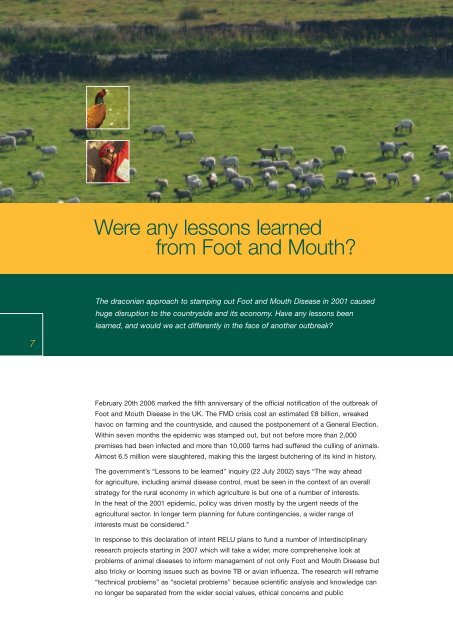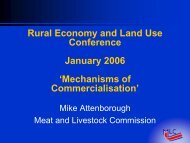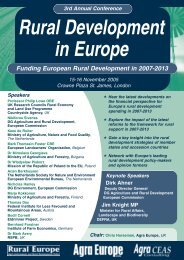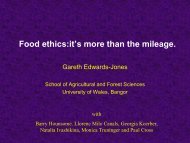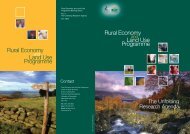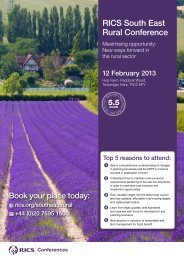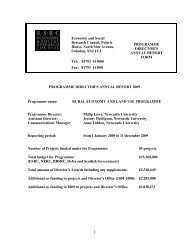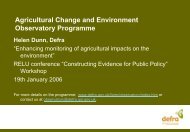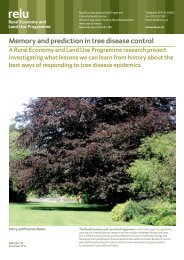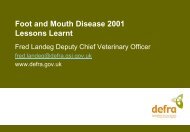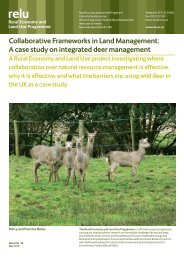Download pdf - Rural Economy and Land Use Programme
Download pdf - Rural Economy and Land Use Programme
Download pdf - Rural Economy and Land Use Programme
You also want an ePaper? Increase the reach of your titles
YUMPU automatically turns print PDFs into web optimized ePapers that Google loves.
Were any lessons learned<br />
from Foot <strong>and</strong> Mouth<br />
The draconian approach to stamping out Foot <strong>and</strong> Mouth Disease in 2001 caused<br />
huge disruption to the countryside <strong>and</strong> its economy. Have any lessons been<br />
learned, <strong>and</strong> would we act differently in the face of another outbreak<br />
7<br />
8<br />
February 20th 2006 marked the fifth anniversary of the official notification of the outbreak of<br />
Foot <strong>and</strong> Mouth Disease in the UK. The FMD crisis cost an estimated £8 billion, wreaked<br />
havoc on farming <strong>and</strong> the countryside, <strong>and</strong> caused the postponement of a General Election.<br />
Within seven months the epidemic was stamped out, but not before more than 2,000<br />
premises had been infected <strong>and</strong> more than 10,000 farms had suffered the culling of animals.<br />
Almost 6.5 million were slaughtered, making this the largest butchering of its kind in history.<br />
The government’s “Lessons to be learned” inquiry (22 July 2002) says “The way ahead<br />
for agriculture, including animal disease control, must be seen in the context of an overall<br />
strategy for the rural economy in which agriculture is but one of a number of interests.<br />
In the heat of the 2001 epidemic, policy was driven mostly by the urgent needs of the<br />
agricultural sector. In longer term planning for future contingencies, a wider range of<br />
interests must be considered.”<br />
In response to this declaration of intent RELU plans to fund a number of interdisciplinary<br />
research projects starting in 2007 which will take a wider, more comprehensive look at<br />
problems of animal diseases to inform management of not only Foot <strong>and</strong> Mouth Disease but<br />
also tricky or looming issues such as bovine TB or avian influenza. The research will reframe<br />
“technical problems” as “societal problems” because scientific analysis <strong>and</strong> knowledge can<br />
no longer be separated from the wider social values, ethical concerns <strong>and</strong> public<br />
underst<strong>and</strong>ing. <strong>Rural</strong> communities, especially farmers, are struggling to adapt to change,<br />
where social, economic, environmental <strong>and</strong> ethical concerns have to be balanced, <strong>and</strong><br />
technological developments absorbed in an increasingly globalised market. RELU’s research<br />
will throw light on how the restraints on, <strong>and</strong> options for disease prevention <strong>and</strong><br />
management are being affected.<br />
The second RELU debate heard presentations by Professor Neil Ward, Director, Centre<br />
for <strong>Rural</strong> <strong>Economy</strong>, Newcastle University; Professor Jeff Waage, Director, Centre for<br />
Environmental Policy, Imperial College, London; <strong>and</strong> Dr Fred L<strong>and</strong>eg, Deputy Chief<br />
Veterinary Officer, Department for Environment, Food <strong>and</strong> <strong>Rural</strong> Affairs.<br />
It is generally agreed, Dr L<strong>and</strong>eg says, that the FMD virus entered the UK in late<br />
January 2001 on a farm in Heddon on the Wall, NE Engl<strong>and</strong>, where pigs were fed with<br />
unprocessed waste food imported from the Far East. The virus was spread by the wind,<br />
<strong>and</strong> by 12 February had infected sheep 5 km away. FMD is not easy to spot in sheep<br />
so these animals were transported <strong>and</strong> traded right across Engl<strong>and</strong> <strong>and</strong> Wales before<br />
the disease was suspected. By the time it was diagnosed on 19 February, 57 farms<br />
in 16 counties had been infected.


